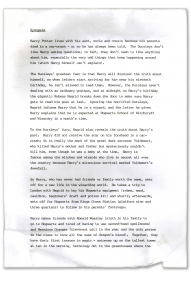Note: In Rowling's own words, "the original synopsis of 'Philosopers Stone' which I sent out to Publishers and which kept wingin its way back!". The first part of the synopsis was shared on her website. The second part, from "mandres and wolfsbane are kept..." was available thanks to the British Library Exhibition and it was reproduced on the companion books of the event.
Harry Potter lives with his aunt, uncle and cousin because his parents died in a car-crash – or so he has always been told. The Dursleys don’t like Harry asking questinos; in fact, they don’t seem to like anything about him, especially the very odd things that keep happening around him (which Harry himself can’t explain).
The Dursleys’ greatest fear is that Harry will discover the truth about himself, so when letters start arriving for him near his eleventh birthday, he isn’t allowed to read them. However, the Dursleys aren’t dealing with an ordinary postman, and at midnight on Harry’s birthday the gigantic Rubeus Hagrid breaks down the door to make sure Harry gets to read his post at last. Ignoring the horrified Dursleys, Hagrid informs Harry that he is a wizard, and the letter the gives Harry explains that he is expected at Hogwarts School of Witchcraft and Wizardry in a month’s time.
To the Dursleys’ fury, Hagrid also reveals the truth about Harry’s past. Harry did not receive the scar on his forehead in a car-crash; it is really the mark of the great dark sorcerer Voldemort, who killed Harry’s mother and father but mysteriously couldn’t kill him, even though he was a baby at the time. Harry is famous among the witches and wizards who live in secret all over the country because Harry’s miraculous survival marked Voldemort’s downfall.
So Harry, who has never had friends or family worth the name, sets off for a new life in the wizarding world. He takes a trip to London with Hagrid to buy his Hogwarts equipment (robes, wand, cauldron, beginners’ draft and potion kit) and shortly afterwards, sets off for Hogwarts from Kings Cross Statino (platform nine and three quarters) to follow in his parents’ footsteps.
Harry makes friends with Ronald Weasley (sixth in his family to go to Hogwarts and tired of having to use second-hand spellbooks) and Hermione Granger (cleverest girl in the year and the only person in the class to know all the uses of dragon’s blood). Together, they have their first lessons in magic – astonomy up on the tallest tower at two in the morning, herbology out in the greenhouses where the mandrakes and wolfsbane are kept, potion down in the dungeons with the loathsome Severus Snape. Harry, Ron and Hermione discover the school’s secret passageways, learn how to deal with Peeves the poltergeist and how to tackle and angry mountain troll: best of all, Harry becomes a star player at Quidditch (wizard football played on broomsticks).
What interests Harry and his friends most, though, is why the corridor on the third floor is so heavily guarded. Following up a clue dropped by Hagrid (who, when is not delivering letters, is Hogwarts’ gamekeeper), they discover that the only Philosopher’s Stone in existance is being kept at Hogwarts, a stone with powers to give limitless wealth and eternal life. Harry, Ron and Hermione seem to be the only people who have realised that Snape the potions master is planning to steal the stone – and what terrible things it could do in the wrong hands. For the Philosopher’s Stone is all that is needed to bring Voldemort back to full strength and power… it seems Harry has come to Hogwarts to meet his parents’ killer face to face – with no idea how he survived last time…
The following images are related to this writing

Previous writing: « Fan Sites (Desktop Website)
Next writing: Diary (Desktop Website) »
